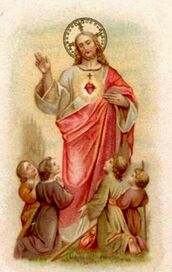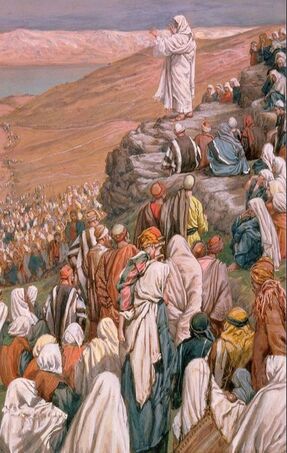
How low a man can fall when he leaves the narrow path of humility, we see in a certain Justin, a Franciscan friar and companion of St. John Capistran. He had received extraordinary graces by means of prayer, vigilance, mortification and other pious practices, so that far and near he was venerated as a pattern of Christian perfection and as a man highly favored by God. Even Pope Eugene IV., having received very favorable accounts of him, and being anxious to become personally acquainted with him, invited him to come to Rome. When he was introduced the Pope rose from his seat, went to meet him, embraced him and made the friar sit beside him. On Justin's return St. John Capistran looked at him sorrowfully, and said: "O brother Justin, you went away an angel; you come back a devil." Events confirmed only too plainly the truth of this harsh language. Justin seemed to grow prouder from day to day; for the most trivial reason he loudly complained that he was not treated with becoming respect; finally he forgot himself so far as to thrust a knife into the breast of one of the brothers, by whom, as he thought, he had been treated with contempt. After this murder he fled, and wandered about committing many other crimes. At last he was cast into prison at Naples, and, hardened in unbelief and malice, he put an end to his life. If he had remained humble he might now be a saint in heaven.
Among all the virtues of our Blessed Lord, there are three especially which we ought to strive continually to learn of Him, namely, Meekness, Humility, and Obedience. And why so? First, because He Himself points them out especially for our imitation, and, secondly, because they are all three opposed to the deadly sin of pride, which was the beginning of evil, and the cause of the fall of both the angels and our first parents. Pride, the mother of many other vices, shows itself especially in three ways, namely, by resenting injuries, attributing all good to itself, and setting itself up against lawful authority. Now the three virtues before mentioned are directly opposed to these three forms of pride.
Meekness enables us to bear injuries and affronts without resentment; Humility makes us acknowledge by deeds, as well as words, that whatever good we have comes from God; and Obedience makes us submit our will to that of our superiors for the love of God. Hence if we practice these three virtues, we shall heal three of the worst wounds inflicted on our souls by pride, and we shall have gone a great way towards making our souls conformable to the image of Jesus Christ.
General Howard was a great soldier of the Civil War, he was not only brave but just and kind, and every one who knew him loved him. During General Sherman's last campaign in the South he had been put at the head of a special division. A great parade was to take place in the city of Washington at the close of the war, and the officer whose place General Howard had taken insisted on riding at the head of the division, and his friends were so powerful that General Sherman could not refuse the request. He sent for General Howard, told him of the request and asked him if he would mind to let the other General ride at the head of the division. General Howard replied that the division was now his command and he had the right to ride at its head. "Of course, that is true" said General Sherman, "but, Howard, you are a Christian, and don't care so much about show, and your brilliant record can stand this disappointment.,, "Oh," said General Howard, "if that's what you mean, let him ride there and let him have the honor." "Very well," said General Sherman, "let him have the honor, but you will report to me before the start of the parade and ride by my side at the head of the whole army."
So you see that by giving up what he had a right to claim, this general gained a much greater honor. Jesus tells us a great many things about humility and about seeking the first place. And He tells us that the man who is last may be the first, and the man who is least may be greatest, and that the man who is willing to be a servant is, after all, a king.
Of Meekness and Humility, our Blessed Lord says to us in the Holy Gospel, "Learn of me, because I am meek and humble of heart." These three are, therefore, the favorite virtues of the Sacred Heart of Jesus; and if you wish to know to what extent our Lord practiced them, you have only to read the history of His cruel Passion. There you will see Him betrayed, blasphemed, mocked, derided, blindfolded, struck on the face, spit upon, scourged, crowned with thorns and crucified, yet uttering not a word of complaint, on the contrary, praying for His executioners.
All the exercises of virtue and of good works are valueless before God without humility. This is strikingly shown in the following legend. A certain saint had a vision. He was placed at the judgment-seat of God, and saw how every moment souls, who had departed this life, arrived to be judged. Each had a sack over his shoulder ; in the front part were his good works, and in the part hanging behind were his sins. Both the good works and the sins, after their kind, were put up in packages. The sack in each case was opened and the packages with their good works and sins were laid upon the scales. The packages of the sins of most people by far outweighed the packages of good works, whereupon the divine Judge pronounced sentence of condemnation. Finally a woman came with a sack, the front part of which was full of good works while the other part contained only a few faults. The saint thought: "Thanks be to God, this woman will certainly go to heaven.' But when the good works were put into the scales they were as light as a feather and were overbalanced by the sins. Full of astonishment the saint asked an angel who was standing by : "How is it that this multitude of good works has so light a weight?" The angel replied: "Know that this woman has done a great deal of good, but since she was full of vanity and pride, her good works are without weight in the eyes of the all-seeing Judge, and she is lost forever."
My dear boys and girls, learn from what you have heard, how necessary a virtue humility is for our salvation. Without it, there is no forgiveness of sin, no good work meritorious for heaven, and no final perseverance.
Source: Story Sermonettes for the Children's Mass, Imprimatur 1921





 RSS Feed
RSS Feed